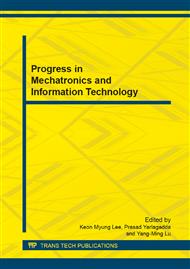p.243
p.247
p.251
p.255
p.259
p.267
p.274
p.280
p.284
A Novel Adaptive Integrated Navigation Filtering Method Based on ARMA/GARCH Model
Abstract:
This paper proposes a novel adaptive integrated navigation filtering method based on autoregressive moving average (ARMA) model and generalized autoregressive conditional heteroscedasticity (GARCH) model. The main idea in this study is to employ ARMA/GARCH model to estimate statistical characteristics of filtering residual series online, namely, the conditional mean and conditional standard deviation, and then the filter parameters are adaptively adjusted based on forecasted results of ARMA/GARCH model in order to improve the reliability of the system when there are abnormal disturbance and other uncertain factors in real condition. On this basis, experiment is used to verify the validity of the method. The simulation results demonstrate that the ARMA/GARCH model can well capture the unusual condition of GPS receiver output, and this adaptive filtering method can effectively improve the reliability of the system.
Info:
Periodical:
Pages:
259-266
Citation:
Online since:
November 2013
Authors:
Keywords:
Price:
Сopyright:
© 2014 Trans Tech Publications Ltd. All Rights Reserved
Share:
Citation:


